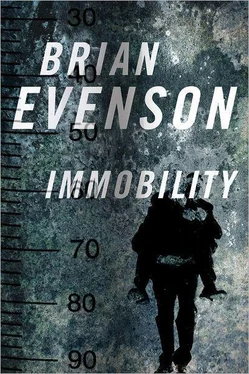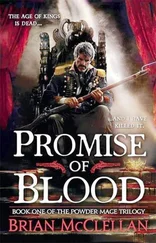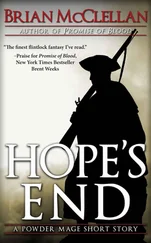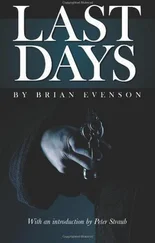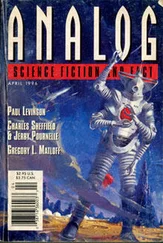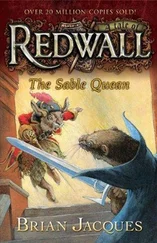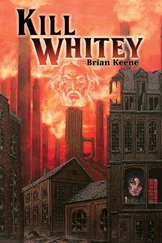“Qatik,” he asked, “are you all right?”
He heard a groan again, made for it, knuckling backwards over the ground until he found the man’s hand again. From there, he worked his way up the arm and to the hood. He shook the mule’s shoulders.
“Qatik,” he said again.
“What happened?” asked Qatik, his voice slow and thick.
“We fell,” said Horkai. “You must have tripped.”
Qatik coughed. “I am sorry,” he said. “I am weaker. Not paying enough attention. Not enough sleep. Or food. Blood on the inside of the faceplate makes it hard to see.”
“No need to apologize,” said Horkai.
When Qatik didn’t say anything, he shook him again.
“Just need a moment,” said Qatik. “I will be all right soon.”
“Shall we wait for morning before moving on?” Horkai asked. “When we can see?”
“Can’t,” said Qatik. “By morning I am dead.”
He lay there for a few minutes more, Horkai leaving him alone. Finally he began to move, one of his arms brushing past Horkai’s face. His hands were busy at something and then he grunted, and the movements stopped.
“Suit torn,” he said, his voice flat and dead.
“Where?” asked Horkai, picturing in his head again the tear on the back of Qatik’s arm.
“Belly,” said Qatik. “Something went in when I tripped. I am cut, too. Cannot say how bad it is.”
And then he fell silent. Horkai waited, trying to see him in the dark, catching only the vaguest hint of his outline. He thought he might have drifted off again. He reached out and felt around, touched him gently on the belly, found the fabric there sticky with blood.
“It’s all right if you can’t go on,” said Horkai.
“Just give me a minute,” said Qatik. “I just need a minute.”
* * *
HE HAD ALREADY BECOME RECONCILED enough to the idea of Qatik’s death when the man, grunting, sat up. He groped about until he found Horkai’s shoulder, then used it pull himself to his knees.
“How bad is it?” asked Horkai.
“Not good,” said Qatik. “But this is not what will kill me.” He groped around until he found Horkai’s hand and pressed one of the backpacks into it.
“You will help,” he said. “You have an additional purpose now. It is this: There is a fusee in here. Find it and break it open.”
Horkai felt around the edge of the bag until he found the pull for the zipper. He tugged it open and stuck his hand in, feeling through the shapes until he found a bundle of long, thin tubes. He extracted one, then pulled it out and sniffed it, smelling the garlicky odor of phosphorus.
He carefully felt his way along it until he found where the casing was scored, then quickly cracked it open. It flared up immediately, its light red and blinding, and he quickly tossed it a little distance away.
“Good,” said Qatik. “This part is done.”
Horkai could see him now, stark in the glow of the flare. The rip in the front of the suit was perhaps four inches long. Blood had spilled down and no doubt was pooling inside it as well. In one hand Qatik held a sharp-edged piece of metal, perhaps part of a signpost, slick with blood. He balanced on his knees, swaying slightly.
“There is an ampoule of morphine and a hypodermic,” said Qatik.
“Yes,” said Horkai. “Here they are.”
“Prime the needle and load it. Push it through the rip in the suit and inject me.”
“How much?”
“All of the ampoule,” said Qatik.
“Is that a lot?”
“Yes, a lot. You will have to speak to me to keep me awake.”
He affixed the needle to the hypodermic. Breaking off the ampoule’s tip, he pushed the needle in, drawing the fluid up into the chamber. Carefully he parted the lips of the tear until he could see Qatik’s bloody shirt behind it. Rapidly he sank the needle in and depressed the plunger.
Qatik groaned and swayed but did not fall.
“All right?” said Horkai.
“Now,” said Qatik. “In the backpack is a plastic bottle of seam sealant.”
Horkai searched through the backpack, found it.
“Seal the wound with it, and then the suit.”
Horkai took the cap off and pushed the bottle into the opening, spreading the slit wide with his fingers again, turning Qatik a little now so that the light from the fusee would shine on the wound. It was broad and deep, and bits of metal were still in it, blood and fluid oozing around them.
He tried to pick the bits free but Qatik groaned and pushed at his shoulder.
“Just seal it,” he said through gritted teeth.
And so he did, squeezing the tube until a translucent substance squirted out of it and filled the wound. It hissed against the flesh, connecting to it, becoming a sort of dark web. He heard Qatik’s breathing grow more labored, the muscles around the wound tightening. He squeezed a little more in, then realized that it had started to bind not only to the flesh but to Qatik’s shirt as well. He watched it until he was sure the bleeding had stopped and then pulled both sides of the suit’s fabric together and sealed them to each other. He held on too long with his fingers and had to tear them bloody to free them.
“All right,” said Horkai. “It’s done.”
“Good,” said Qatik, and then made a heaving noise and retched inside his suit. What came up was mostly blood. It gleamed wetly on the inside of the faceplate, slipping down. He reached out and steadied himself against Horkai’s shoulder. “I may last another hour or two,” he said, and then retched again.
They stayed there for a few minutes longer, until the fusee began to sputter. Using Horkai as a support, Qatik pulled himself fully to his feet.
“Yes,” he said. “I think I can do it.” He stumbled over to the remains of the barrier edging the freeway, leaned against it, and squatted down.
“You will have to climb on,” he said to Horkai. “If you can manage that, I might be able to stand.”
Looping the backpack around one arm, Horkai knuckled over to him. Carefully, he heaved himself up until he was precariously balanced on the barrier and then fell on Qatik’s back, wrapping his arms around his neck. His legs dangled, scraping the ground. Qatik grabbed them and pulled Horkai’s body closer, until he was riding piggyback. Slowly, Qatik straightened up.
When Horkai started to pull himself higher, Qatik said in a breathless voice, “Not the shoulders. I cannot manage this. Keep your arms tight around my neck and hold on.”
* * *
THE GOING WAS SLOW. As they moved away from the sputtering fusee, Qatik stumbling a little, the light faded and then was entirely gone. Horkai could see only the wiry ghost of the fusee still burning in his head.
“Can you see?” he asked Qatik.
“A little,” said Qatik. His voice was very thick now, slurred. “Not much.”
“Shouldn’t we wait until morning?”
“No such thing as morning,” said Qatik.
He kept on, moving slowly, feeling his way forward when he had doubts. Horkai could not help but think about what might happen if they fell again. Next time, he was certain, they wouldn’t get back up.
Horkai began to talk, at first simply urging Qatik on, telling him he could do it, but slowly moving to other things. He spoke of the little he could remember about the Kollaps, offered the scattered bits of it to Qatik, who did not respond back. He spoke of what he could remember about the world before the Kollaps, began to detail what animals could be found on a farm and what they looked like. Why could he remember such things in such detail, reconstruct so many details of the world as it had been, but couldn’t remember his own place in it? When he’d finished with that, he began hoarsely to sing, songs he remembered from when he was a child. “The Farmer in the Dell” he started with since it made a good transition from talk about farm animals, then a song about a garbage truck, followed by a long explanation of what a garbage truck was. He started a lullaby but then thought better of it. And then, tired and distracted himself, he slowly fell silent.
Читать дальше
